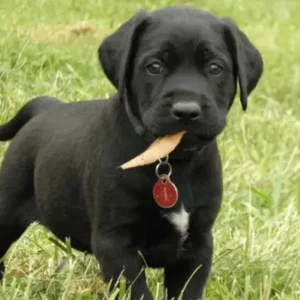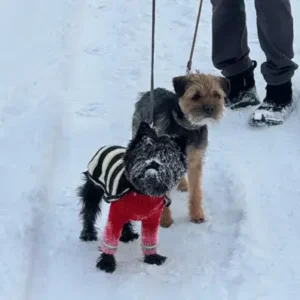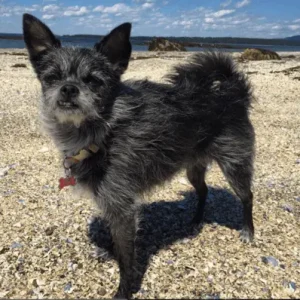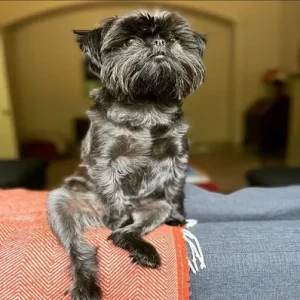Caucasian Shepherd Dog History/Origin
The Caucasian Shepherd Dog is one of the oldest Molasser breeds, originating from the Caucasus Mountain region over 2,000 years ago. Their exact origins are mysterious, with theories suggesting they descended from domesticated wolves or a mix of Mastiffs and other dog breeds.
Some experts believe they came from sheepdogs migrating from Tibet, while archaeological evidence points to Mesopotamia.
Regardless, these dogs have been invaluable companions to Caucasus shepherds, fiercely guarding sheep and owners from predators like wolves, jackals, and bears.
Bred for fearlessness, strength, and resilience to harsh conditions, this purebred developed various regional variants, with the Georgian type becoming the standard recognized by most kennel clubs.
Caucasian Shepherd History- Source: AKC.org
In the 1900s, the USSR used Caucasian Shepherds as guard dogs for prisoners and to develop other breeds in army kennels. By the 1960s, East Germany employed them as border patrol dogs along the Berlin Wall. After the wall fell in 1989, many of the 7,000 patrol dogs were adopted by German families.
Caucasian Shepherd Dog Personality
The Caucasian Shepherd Dog is a loving and loyal family dog, known for being a fierce protector. However, they are naturally distrustful of strangers and do not get along well with unfamiliar dogs or other animals.
- Temperament
The Caucasian Shepherd Dog is renowned for its strong protective instincts and unwavering loyalty to its family. While they are naturally cautious around unfamiliar people, this trait helps them serve as excellent guard dogs.
With proper training and early socialization, they can be affectionate and gentle with their loved ones, including children. Their strong sense of duty and keen alertness make them dedicated companions, especially in environments where their guarding skills are valued.
- Potential Challenges
Owning a Caucasian Shepherd Dog comes with several potential challenges. Their strong territorial instincts and natural distrust of strangers can lead to aggressive behavior if not properly managed. Training these intelligent but stubborn dogs requires patience, consistency, and firm boundaries.
Novice owners may find their strong-willed nature difficult to handle. Early socialization is crucial for this breed. Without it, issues with aggression towards new people and animals can arise. Proper training and exposure from a young age are essential.
Caucasian Shepherd Dog Physical Appearance
The Caucasian Shepherd is a powerful, athletic dog. It has strong muscles and heavy bones for its height. The head is large and wedge-shaped, tapering to a blunt muzzle. Its high-set ears may hang down or be cropped. The eyes are deep-set and oval-shaped. The thick tail hangs down to the hock.
- Size
Caucasian Shepherd Dogs are massive, with males typically weighing between 110 to 170 pounds and females averaging around 99 to 150 pounds. Some dogs may weigh more or less, depending on their origin or type. Mountain dogs are more muscular, while plain dogs are leaner. Males stand about 27 to 30 inches tall at the shoulder, and females are between 25 and 28 inches. They are considered a giant breed.
- Coat color
There are three coat lengths seen in Caucasian Shepherd Dogs: long, medium, and short. The longer the hair, the more pronounced the mane is around their necks and the feathering is around their hind legs and tails. All three lengths of coat are quite thick. They are double-coated, with the undercoat being fine and soft, while the outer coat is coarse and longer.
The Caucasian Shepherd Dog can be gray, fawn, red, cream, tan, and even solid white. Coats may also be brindle or have large patches of two or more colors. They often have white markings on the body and a dark “mask” around the face.
White and tan Caucasian Shepherd- Source: AKC.org
Grey Caucasian Shepherd- Source: barkinstyledog_grooming
Cream and tan Caucasian Shepherd- Source: AKC.org
Caucasian Shepherd Dog Gender Differences
Male Caucasian Shepherd Dogs are distinctly masculine, featuring well-developed withers and larger heads compared to females. They are generally more massive, and larger, and often have shorter bodies in comparison to females.
Despite these size differences, both genders exhibit similar traits in temperament, coat type, and coloration. Size variation is the primary distinguishing factor between male and female Caucasian Shepherds.
Caucasian Shepherd Dog Feed/Nutrition
Caucasian Shepherd Dogs should be fed a diet suitable for giant breeds with moderate energy needs, including proteins like beef, chicken, turkey, lamb, shrimp, eggs, and fish. Consulting a veterinarian or professional nutritionist is essential to determine the right food type and portion size for your dog, considering individual needs and potential health issues.
Dietary requirements will vary from puppyhood to adulthood and may need adjustment over time. It’s important to monitor food intake to prevent overeating and weight gain, potentially opting for smaller, more frequent meals to reduce the risk of bloat, a serious condition in dogs.
Caucasian Shepherd Dog Health
Caucasian Shepherd Dogs are generally robust, yet like all breeds, they may be susceptible to specific health issues. Here are some common concerns associated with this breed:
- Hip Dysplasia: Caucasian Shepherd Dogs may develop Hip Dysplasia, an inherited condition affecting the hip joints, resulting in instability and arthritis. This issue is particularly common among large and giant breeds like the Caucasian Shepherd.
- Elbow Dysplasia: It is another concern, similar to hip dysplasia but affecting the elbow joints. It can cause pain and lameness, impacting the dog’s mobility and comfort.
- Canine Gastric Torsion: It is a critical condition where the stomach fills with gas and twists, often seen in deep-chested breeds such as the Caucasian Shepherd. Immediate veterinary attention is crucial to treat this life-threatening emergency.
- Obesity: This can affect Caucasian Shepherds due to their size and slower metabolism. Without proper diet and exercise, they may become overweight, increasing the risk of joint problems and heart disease.
- Entropion: It is an eyelid condition where the lower eyelid rolls inward, leading to irritation and potential eye damage. Regular veterinary care can help manage and treat this issue to prevent discomfort and maintain eye health.
Caucasian Shepherd Dog Care and Grooming
Caucasian Shepherd Dogs require regular grooming to manage their thick coats, ideally brushing them at least twice weekly to remove loose hair and prevent mats.
They undergo a significant shedding period annually, which can be managed with more frequent brushing and occasional baths. Given their size, bathing may be challenging, so it’s practical to bathe them as necessary or seek professional grooming assistance.
Caucasian Shepherd Dogs need regular exercise to stay healthy and happy. Daily walks and playtime in a secure area are essential for maintaining their physical fitness and mental well-being.
Given their size and protective nature, incorporating obedience dog training tips and socialization into their routine is also beneficial. Regular exercise helps keep their weight in check, supporting overall health.
Caucasian Shepherd Dog Rescue Groups
Rescue groups for Caucasian Shepherd Dogs focus on rescuing, rehabilitating, and finding homes for these dogs in need. They provide medical care and behavioral support as needed. These organizations also educate potential adopters about the breed’s needs and help match dogs with suitable families. Their work is vital in ensuring the well-being and adoption of Caucasian Shepherd Dogs.
Caucasian Shepherd Dog Price
The price of a Caucasian Shepherd Dog typically ranges from $1,200 to $2,500, depending on factors such as breeder reputation, pedigree, and location.
Caucasian Shepherd Dogs for sale can be found through reputable breeders or adoption centers. Buyers should look for breeders focusing on health, temperament, and socialization. Before purchasing, inquire about the dog’s health, upbringing, and living conditions. Adoption centers provide opportunities to offer a loving home to dogs in need.
Interesting Facts
- They have been featured in the movie “ Myrsky”.
Myrsky-Source: IMDb
- Their thick double coat not only provides insulation against cold but also sheds water efficiently, making them well-suited to harsh weather conditions.
Best For
Caucasian Shepherd Dogs are best suited for individuals with experience handling large, protective breeds. They require confident, assertive owners, and are capable of providing firm yet loving leadership. These dogs thrive in environments where they have ample space to roam and regular opportunities for exercise. Due to their protective instincts, they are well-suited for families seeking a loyal and vigilant guard dog.
Top Names
| Male Caucasian Shepherd Dog Names | Female Caucasian Shepherd Dog Names |
| Titan | Luna |
| Maximus | Bella |
| Thor | Sasha |
| Apollo | Nala |
| Zeus | Arya |

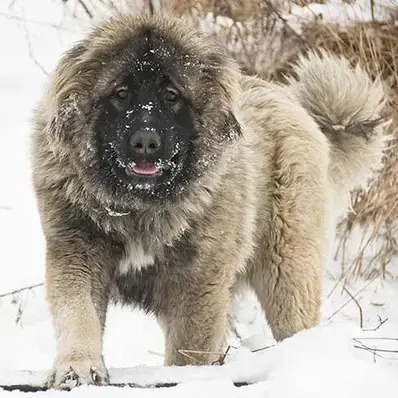







 Caucasian Shepherd History- Source:
Caucasian Shepherd History- Source: 

 White and tan Caucasian Shepherd- Source:
White and tan Caucasian Shepherd- Source:  Grey Caucasian Shepherd- Source:
Grey Caucasian Shepherd- Source:  Cream and tan Caucasian Shepherd- Source:
Cream and tan Caucasian Shepherd- Source: 
 Myrsky-Source:
Myrsky-Source: 

